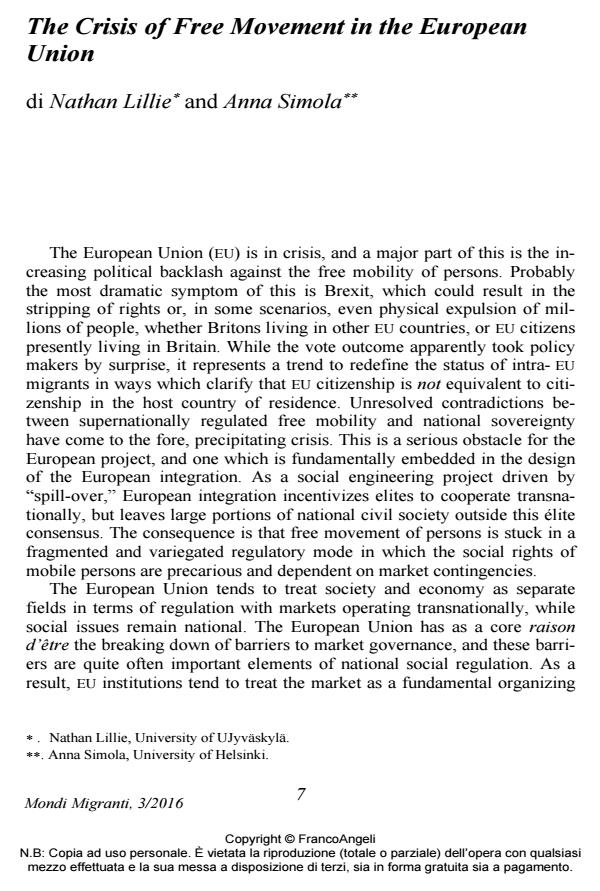The Crisis of Free Movement in the European Union
Titolo Rivista MONDI MIGRANTI
Autori/Curatori Nathan Lillie, Anna Simola
Anno di pubblicazione 2017 Fascicolo 2016/3
Lingua Inglese Numero pagine 14 P. 7-19 Dimensione file 198 KB
DOI 10.3280/MM2016-003001
Il DOI è il codice a barre della proprietà intellettuale: per saperne di più
clicca qui
Qui sotto puoi vedere in anteprima la prima pagina di questo articolo.
Se questo articolo ti interessa, lo puoi acquistare (e scaricare in formato pdf) seguendo le facili indicazioni per acquistare il download credit. Acquista Download Credits per scaricare questo Articolo in formato PDF

FrancoAngeli è membro della Publishers International Linking Association, Inc (PILA)associazione indipendente e non profit per facilitare (attraverso i servizi tecnologici implementati da CrossRef.org) l’accesso degli studiosi ai contenuti digitali nelle pubblicazioni professionali e scientifiche
This article makes the case that the institutional construction of the EU integration process has furthered the cause of free movement, but is producing a backlash against the free mobility of persons because of its mechanistic dynamics. The backlash against free movement is manifesting in constraints on the social rights of mobile EU citizens, producing precarity. Because the EU has large numbers of people moving all the time, limiting their citizenship access means creating a vast underclass. People are able to move from place to place to work, but have different access to social rights depending on the value of their labour on the market, and on their relationship to the territory they are in. Their lack of rights makes them more desperate, so they accept less, which in turn worsens the labour market conditions for all workers. Greater limits on social citizenship rights, worsens the problem it intends to solve because it recommodifies the labour of those caught outside the charmed circle of social citizenship.
L’articolo argomenta che la costruzione istituzionale del processo di integrazione dell’Unione europea ha promosso la libera circolazione, producendo però un effetto boomerang a causa delle dinamiche meccanicistiche che la caratterizzano. La reazione contro la libertà di movimento si manifesta nella riduzione dei diritti sociali riconosciuti ai cittadini , che a sua volta produce un incremento della precarietà dei migranti interni. Considerato l’elevato numero di cittadini UE mobili, limitare il loro accesso alla cittadinanza significa creare una vasta sottoclasse, poiché gli individui possono muoversi da un posto all’altro per lavorare, ma hanno un accesso differenziato ai diritti sociali in base al valore della loro forza lavoro nel mercato e alla loro relazione con il territorio in cui si trovano. La mancanza di diritti li rende più vulnerabili e disponibili ad accettare paghe più basse, producendo un inasprimento delle condizioni di lavoro per tutti i lavoratori. Di conseguenza, l’introduzione di limiti ai diritti sociali di cittadinanza, peggiora ulteriormente il problema che vorrebbe risolvere, poiché genera un processo di ri-mercificazione del lavoro di chi è escluso dall’affascinante sfera della cittadinanza sociale.
Parole chiave:Libertà di movimento, integrazione europea, migrazioni lavorative, diritti sociali europei, cittadinanza sociale, cittadinanza dell’Unione Europea
- EU migrant workers and the right to health in the Netherlands during and beyond the COVID-19 pandemic Sandra Mantu, Lisa Berntsen, Tesseltje de Lange, Anita Böcker, Natalia Skowronek, in Transfer: European Review of Labour and Research /2025 pp.105
DOI: 10.1177/10242589251318693 - Free mobility, locked rights: the posting of construction workers from Portugal Joana Marques, Luísa Veloso, Catarina Sales Oliveira, in Mobilities /2021 pp.404
DOI: 10.1080/17450101.2020.1863552 - Before Landing: How Do New European Emigrants Prepare Their Departure and Imagine Their Destinations? Diego Coletto, Giovanna Fullin, in Social Inclusion /2019 pp.39
DOI: 10.17645/si.v7i4.2381 - The ‘Singapore scenario’: the uncertain prospects for labour standards in post‐Brexit Britain Charles Woolfson, in Industrial Relations Journal /2017 pp.384
DOI: 10.1111/irj.12198 - Arrival Infrastructures René Kreichauf, pp.249 (ISBN:978-3-319-91166-3)
Nathan Lillie, Anna Simola, The Crisis of Free Movement in the European Union in "MONDI MIGRANTI" 3/2016, pp 7-19, DOI: 10.3280/MM2016-003001